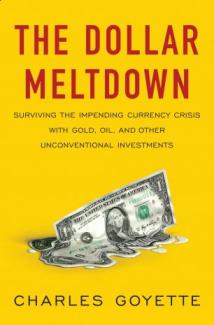While looking through a few books I read a couple of years ago I found the Dollar Meltdown by Charles Goyette. I recommend the book with a couple of words of caution: if you are already steeped in Austrian Economics, Libertarianism and continue to seek this material out, then this book won’t tell you anything new. If however you aren’t continually into this stuff, this book is a fantastic overview. Below is a list of quotes I found in it worthwhile. Most of the quotes are actually quotes of other people that Charles included; but I want to give credit where credit is due.
—–
Chapter 2:
The appearance of periodically recurring economic crises is the necessary consequence of repeatedly renewed attempts to reduce the “natural” rates of interest on the market by means of banking policy.
– Ludwig von Mises… in our system of profit and loss, we cannot possibly think that the government should bail the banks out of bad loans they made, but allow them to keep the profits on the good ones.
– Milton Friedman
Chapter 3:
I place the economy among the first and most important republican virtues, and public debt as the greatest of dangers to be feared.
– Thomas Jefferson
Christmas is a time when kids tel Santa what they want and adults pay for it. Deficits are when adults tell the government what they want and their kids pay for it.
– Richard Lamm, former governor of Colorado
Chapter 4:
Good money is coined freedom.
– Swiss Proverb
Chapter 6:
Inflation, it has been said, is like a country where nobody speaks the truth.
Pg 83As Dostoyevsky’s Grand Inquisitor sad, “In the end they will ay their freedom at our feet, and say to us: ‘Make us your slaves, but feed us.'”
Pg 84
Chapter 7:
Don’t ask me where we’re going to find the money. I’m going to get it where Paulson found it.
– Charles Rangel, House Ways and Means Committee ChairmanToday was President’s Day. Congress commemorated George Washington’s throwing a dollar across the Potomac by throwing $780 billion down a rat hole.
– Jay Leno, The Tonight Show
Chapter 8:
By that, I mean the mistaken belief that public policies focused on frequent wars, huge expenditures on weapons and munitions, and large standing armies can indefinitely sustain a wealthy capitalist economy. The opposite is actually true.
– Chalmers Johnson, Blowback“The world has gotten itself into trouble with its heavy reliance on the dollar.”
– Vladimir Putin, Pg 118“Maybe we can price the oil in the euro,”
OPEC secretary-genreal Abdalla El-Badri, Pg 118
Chapter 9:
… if we face a monopolist we are at his mercy. And an authority directing the whole economic system would be the most powerful monopolist conceivable.
– F.A. HayekThe more prohibitions there are, the poorer the people become …. The greater the number of statutes, the greater the number of thieves and brigands. – Lao-tzu
Germany’s stunning economic recovery miracle after World War II took place over American and British objections. In 1948 the German economy remained as broken and as nonproductive as it had been three years earlier when the war ended. The Allied occupation government had a command economy in place complete with wage and price controls and rationing, some of which were remnants of the defeated Nazi government. Goods were scarce. Much of commerce consisted of primitive barter in cigarettes, chocolate, and nylon stockings. It was in this environment that economic official Ludwig Erhard, knowing that the occupying military governors would be away and not quickly able to object, went on nation-wide radio on a holiday weekend and abolished the controls. General Lucius Clay was the American military governor in Germany at the time. He told Erhard that his advisers insisted lifting the controls was a terrible mistake. “Pay no attention to them, General,” said Erhard, “My advisers say the same thing.”
The results of lifting price controls were immediate and dramatic. Stores that had been all but bare were stocked full of goods in no time at all. Instead of spending their hours in miserable lines waiting for the scarce staples of life under a command economy, people returned to productive activity. Employment expanded as the economy added 6 million new jobs between 1950 and 1960, while the unemployment rate fell from 10.3 percent to 1.2 percent. Over the decade annual economic growth averaged 8 percent. Industrial production soared by 25 percent in 1950 alone, and by 18 percent the next year. Germany was rebuilt; prosperity was restored. Truly it was an economic miracle.
Chapter 11:
To be long gold is, in a grand thematic way, to be short the socialization of risk.
– James GrantO gold! I still prefer thee unto paper, which makes bank credit like a bank of vapor.
– Lord Byron, Don Juan
Chapter 14:
One generation passeth away, and another generation cometh; but the earth abideth forever.
– Ecclesiastes 1:4Wealth is the progressive mastery of matter by mind.
– Buckminster Fuller
Chapter 16:
The world is in permanent monetary crisis, but once in a while, the crisis flares up acutely, and we nosily shift gears from one flawed monetary system to another. We go back and forth from fixed paper rates to fluctuating rates, to some inchoate and aborted blend of the two. Each new system, each basic change, is haled extravagantly by economists, bankers, the financial press, politicians, and central banks, as the final and permanent solution to our persistent monetary woes.
– Dr. Murray RothbardIn contrast to political money, gold is honest money that survived the ages and will live on long after the political fiats of today have gone the way of all paper. – Hans F. Sennholz
